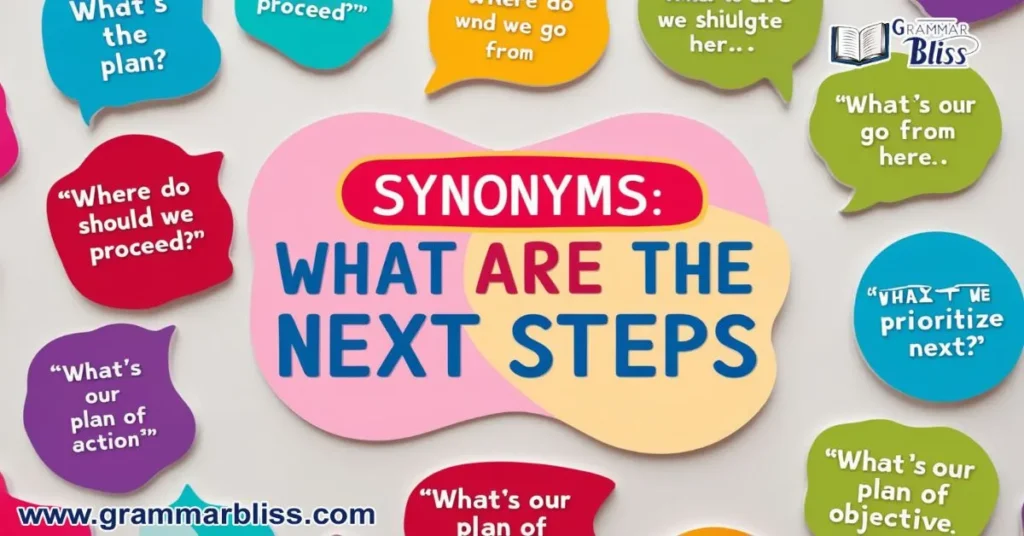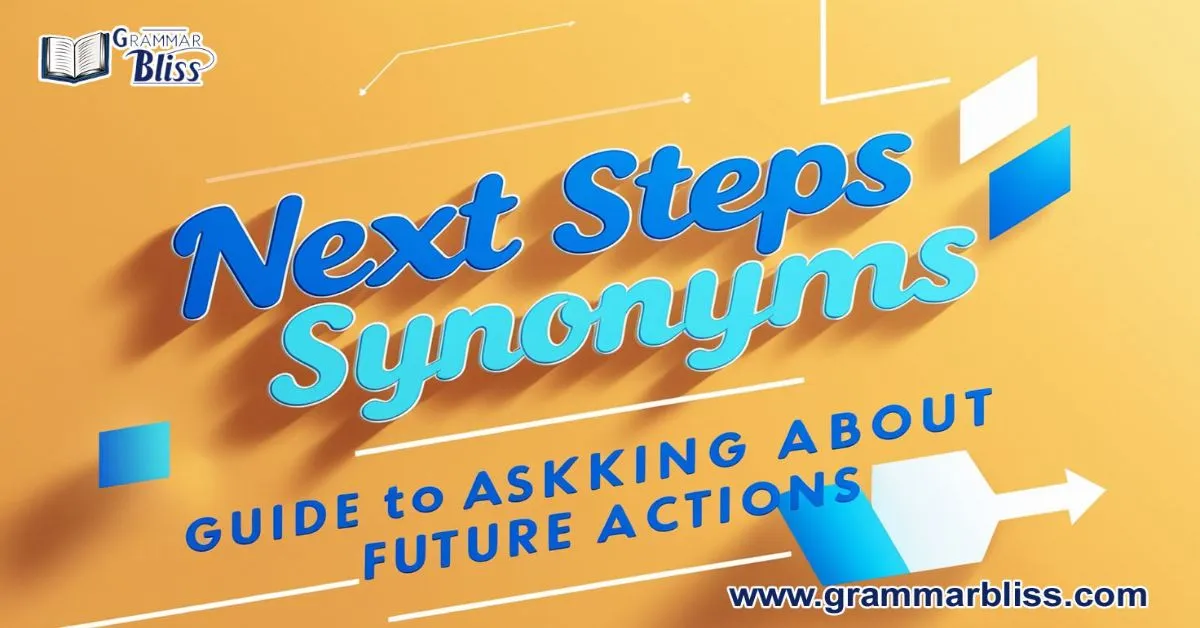When managing a project, clarifying next steps is crucial for maintaining focus and ensuring progress. The question “What are the next steps?” helps determine future actions and establish a clear direction for the team. However, there are many ways to ask this question that can make your communication more effective and professional. Understanding these alternatives can help you tailor your communication tone to fit different situations, whether in professional settings, while project management, or in casual conversations. Here, we’ll explore various synonyms and polite phrasing options to ask what’s next, making your approach to task management more strategic and focused.
Quick Summary
Asking about next steps synonyms is essential for keeping a project or conversation on track. People often use the phrase “What are the next steps?” to clarify the direction and future actions in a process, but it can sometimes sound blunt or overly formal. This guide will cover synonyms and alternatives to this phrase, helping you find more polite and professional phrasing for different situations. Whether you’re leading a meeting, asking for guidance in a project, or simply organizing your next tasks, having various ways to phrase this question will improve your communication and ensure progress.
Read: signor-or-signer-understanding-the-difference-and-proper-usage/
Meaning of “What Are the Next Steps?”

At its core, the phrase “What are the next steps?” refers to asking about the actions that need to happen after a certain point in a process. It clarifies what should be done next, whether in a meeting, project, or decision-making situation. This phrase helps ensure everyone involved stays aligned and knows exactly what to do to keep things moving forward.
When you ask “What are the next steps?”, you are requesting clear guidance on what needs to happen next. It helps align everyone and sets the agenda for the next phase. In the context of project management, this question is crucial for making sure the team knows their tasks and responsibilities.
Usage of “What Are the Next Steps?”
So when should you ask “What are the next steps?”? People typically use this phrase after making a significant decision or completing a task. It helps clarify future actions and ensures that everyone involved understands and plans the next part of the process.
For example, after a meeting, you might ask, “What’s the plan for the next phase?” or “What needs to be done after this?” These questions show your focus on what’s coming next and help move things forward with clarity. You can also ask them during project follow-ups to ensure everyone stays on the same page and doesn’t miss any important steps.
In a work setting, using this phrase regularly can help improve work efficiency, encourage collaboration, and foster proactive communication. It keeps everyone informed and on task, which is essential for task management and project coordination.
“What Are the Next Steps”: Is It Professional to Say?
When used correctly, “What are the next steps?” is perfectly professional and appropriate in many professional settings. It shows that you are focused on progress, willing to take the initiative, and concerned about task completion. However, in certain cases, especially when speaking to someone in a more casual setting, this question might sound a little too direct or formal.
For example, instead of asking “What are the next steps?”, you could use synonyms by saying “What’s our next objective?” or “What should we prioritize next?”. These alternatives keep the focus on what comes next, but they sound more natural and less stiff. The key to sounding polite is to consider the context and the person you’re speaking to.
Asking “What are the next steps?” can clarify future tasks and ensure everyone stays aligned in a meeting or when working with a team. However, it’s always important to balance directness with the right level of politeness.
Advantages or Disadvantages Of “What Are the Next Steps?”
While “What are the next steps?” is clear and direct, it comes with both advantages and disadvantages.
Advantages:
- Clarity: It is straightforward, and everyone knows exactly what you’re asking.
- Focus: This question emphasizes moving forward and keeps everyone focused on what needs to be done.
- Initiative: Asking this shows you are proactive and ready to take the next action.
Disadvantages:
- Can Sound Abrupt: If you ask this too often or in the wrong context, it can come off as abrupt or too formal.
- Overused: Saying it too much can make you sound robotic and disconnected from the human side of communication.
To avoid these downsides, consider using alternative phrases that soften the tone, especially in casual conversations or when speaking to someone you want to build rapport with.
Synonyms: What Are the Next Steps?

There are many different ways to ask about future actions, and each variation can help you sound more natural, professional, or polite, depending on the context. Here are some useful synonyms for “What are the next steps?”:
- What’s the plan?
- Meaning: Asking about the intended actions or decisions.
- Example: “Now that we’ve decided on the product, what’s the plan for launching?”
- What’s the next course of action?
- Meaning: Asking what action to take next in a situation.
- Example: “The issue has been addressed; what’s the next course of action?”
- How should we proceed?
- Meaning: Inquiring about the method of moving forward.
- Example: “We’ve gathered all the data, how should we proceed with the analysis?”
- What do we need to do moving forward?
- Meaning: Asking what needs to be done to continue progress.
- Example: “The project is on track, but what do we need to do moving forward?”
- Where do we go from here?
- Meaning: Inquiring about the next phase or direction after a current point.
- Example: “We’ve finished the prototype, where do we go from here?”
- What’s our next objective?
- Meaning: Asking about the next goal or target.
- Example: “We’ve achieved our current milestone, what’s our next objective?”
- What’s the follow-up action?
- Meaning: Asking about actions to take after a specific task or event.
- Example: “We’ve completed the meeting, what’s the follow-up action?”
- What should we focus on next?
- Meaning: Inquiring about the priority tasks ahead.
- Example: “The first draft is ready; what should we focus on next?”
- What needs to be done now?
- Meaning: Asking about immediate tasks or actions to take.
- Example: “The deadline is approaching, what needs to be done now?”
Learn: is-it-at-january-or-in-january-which-is-the-right-preposition/
- What’s our plan of action?
- Meaning: Asking about the strategy for the next steps.
- Example: “We’ve reviewed all the options, what’s our plan of action?”
- What is our next step in the process?
- Meaning: Inquiring about the next action in a sequence.
- Example: “We’ve finished the proposal; what is our next step in the process?”
- How do we continue from here?
- Meaning: Asking about the direction or process after the current stage.
- Example: “The project has been delayed; how do we continue from here?”
- What actions should we take next?
- Meaning: Asking what specific tasks need to be done next.
- Example: “We’ve finished the research, what actions should we take next?”
- What’s the next phase of the plan?
- Meaning: Inquiring about the upcoming phase in a structured plan.
- Example: “We’ve wrapped up phase one; what’s the next phase of the plan?”
- What should we prioritize next?
- Meaning: Asking what tasks should be given the highest priority.
- Example: “We’ve completed the initial tasks, what should we prioritize next?”
- What’s the next goal we should focus on?
- Meaning: Inquiring about the next objective or target.
- Example: “We’ve reached our sales target; what’s the next goal we should focus on?”
- What’s the next step we should take?
- Meaning: Asking about the immediate action to move forward.
- Example: “We’ve identified the problem, what’s the next step we should take?”
- What should our next move be?
- Meaning: Asking about the next action or decision to make.
- Example: “The deal fell through, what should our next move be?”
- What needs to happen next?
- Meaning: Inquiring about the next action or requirement to keep things going.
- Example: “We’ve completed the review, what needs to happen next?”
Explore: my-home-paragraph-understand-where-we-live/
- Where do we go now?
- Meaning: Asking about the direction to take after a decision or event.
- Example: “We’ve finished the brainstorming session, where do we go now?”
- What is the next step in our agenda?
- Meaning: Inquiring about the next item or topic to address in a meeting or plan.
- Example: “We’ve discussed the first topic, what is the next step in our agenda?”
- How do we proceed from here?
- Meaning: Asking about the method or steps to follow after the current point.
- Example: “The design is finalized, how do we proceed from here?”
- What’s the next decision we need to make?
- Meaning: Inquiring about the next important decision to be made.
- Example: “We’ve agreed on the strategy, what’s the next decision we need to make?”
- What should we tackle next?
- Meaning: Asking what task or problem needs attention next.
- Example: “The presentation is ready, what should we tackle next?”
- What’s our next task?
- Meaning: Inquiring about the next responsibility or task to address.
- Example: “The first task is complete, what’s our next task?”
- What’s the next move in the project?
- Meaning: Asking about the next phase or action to take in a project.
- Example: “We’ve finished phase one, what’s the next move in the project?”
- What actions are required next?
- Meaning: Inquiring about the actions that need to be performed moving forward.
- Example: “The issue is identified, what actions are required next?”
- What’s the next objective in our plan?
- Meaning: Asking about the next goal or target to accomplish in a plan.
- Example: “We’ve hit the first objective, what’s the next objective in our plan?”
Grammar Rules and Examples
When asking about the next steps, it’s important to use the correct grammar. Here are a few simple rules to keep in mind:
- Use the correct verb tense: If you’re referring to an action that needs to happen soon, use the future tense. For example, “What should we do next?” or “What will be the next step?”.
- Use subject-verb agreement: Be sure the subject and verb match in number. For instance, if you’re talking about one action, say “What is the next step?”, but if there are multiple steps, say “What are the next steps?”.
Example Sentences:
- “What’s the next task in the project?”
- “What are the immediate next actions we need to take?”
- “What’s the follow-up plan after this phase?”
FAQ’s
What are the synonyms to asking “What are the next steps?”
Synonyms include “What’s the next course of action?” or “How should we proceed?”
Why is it important to ask about the next steps?
Asking about the next steps ensures clarity, progress, and alignment in any project or task.
Is “What are the next steps?” always professional?
While it’s professional, it can sound a bit direct in some contexts, so using polite phrasing may be more appropriate.
When should I use the question “What’s the next move”?
This is useful when discussing the next significant action in a project, especially after completing a key phase.
Can asking about the next steps improve project management?
Yes, it helps with task management, setting priorities, and keeping the project moving forward efficiently.
Conclusion
Asking “What are the next steps?” is essential for maintaining clarity and focus in any project or task. By exploring different synonyms and polite phrasing, you can adapt your communication to suit various professional settings and situations. Using these alternatives will not only improve task management but also enhance collaboration and decision-making. Whether you’re seeking future actions, clarifying tasks, or aligning goals, understanding how to phrase your questions effectively ensures smooth progress and a more organized approach moving forward. Focus on the right questions to keep projects on track.

